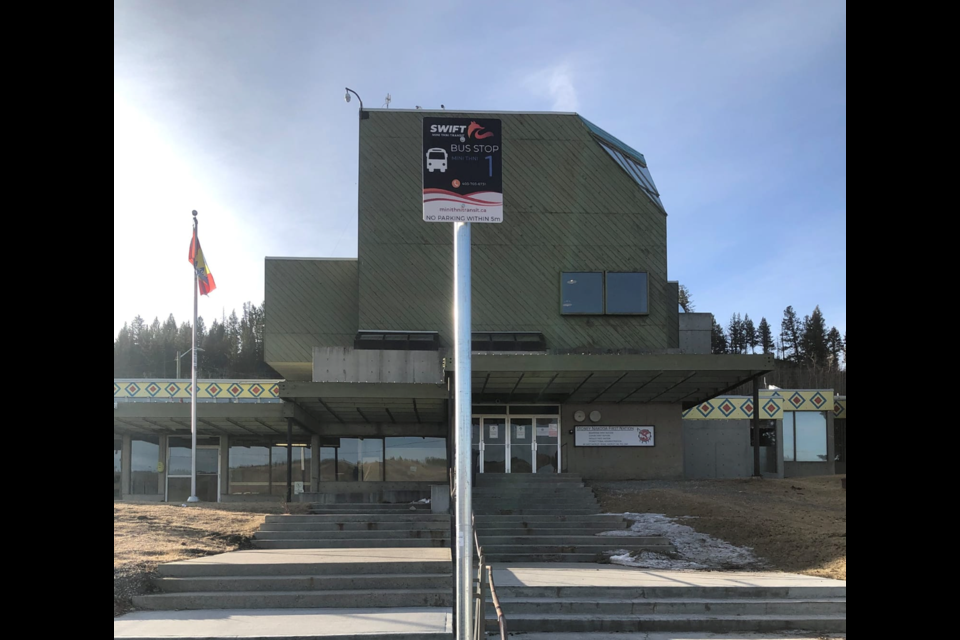ÎYÂRHE NAKODA – Swift Mînî Thnî Transit needs bus shelters and a contingency plan for its sole 26-seater bus.
Importantly, the growing essential service also needs someone who can dedicate their full attention to the transit file as transit coordinator, says Nakoda Emergency Services (NES) director Reg Fountain, who is currently overseeing the Îyârhe Nakoda First Nation transit program.
“Right now, we’re funded for the next fiscal year without issue. The challenges will be in continuing that and improving the service, and therefore finding grants – provincial or federal – to ensure the level of service remains constant or improves,” said Fountain.
“It’s an ongoing initiative on our part. We also don’t have a mass transit coordinator. Right now, that falls in my purview.”
Fountain said having someone dedicated to the position full-time would streamline grant writing and funding acquisition as the Nation acknowledges the need for improvements and a multi-year plan. Swift was formerly managed by Stoney Tribal Administration executive administrative manager Debbie Sailer until she left the position in April.
The transit program initially started as a four-month pilot in March 2022, funded by the Government of Canada’s Aboriginal Entrepreneurship Program and in partnership with Southland Transportation.
The pilot proved successful, with the program still operational over a year later on the same funding model of $5 for a one-way ticket from Mînî Thnî to Cochrane, or vice versa.
However, tracking ridership has been challenging due to the absence of a dedicated position to manage the program.
“What I do know is that ridership has increased,” said Fountain. “We want to make sure that continues to improve. I’d like to see where it’s more than a single bus … If we can put the level of service to where it’s more timely, but not to the point where we’re running without that breakeven – that’s what I’m going to say is a key performance indicator.
“We’re making some headway in being successful in that regard.”
Swift transit is funded by the Nation, with funding streams from each band – Goodstoney, Chiniki and Bearspaw – but in need of new funding lines to improve the service with necessities like bus shelters.
“We’re trying to do something about that. In winter, when it’s minus 30 (degrees Celcius) with blowing wind, you don’t want somebody standing out there on the side of the road,” said Fountain. “That’s one of the aspects of being more responsive to the needs of the Nations members, both in terms of scheduling and providing shelter.”
The NES director further also highlighted the need for a contingency plan for the Swift bus – an older cutaway model that was repurposed for Swift, including the addition of a new engine.
“That bus puts on a lot of kilometres, what are we going to do to make sure that the bus remains an economically viable vehicle, but also a service?” he asked.
“There’s a number of things we’d like to do, but the first thing is to make sure that the Swift transit system is viable for the Nation, and robust and sustainable over a multi-year program.”
In August, NES introduced security guards to the service following an assault on a bus driver by a man trying to board the bus.
According to protective services, the man – when asked to present a fare by the driver – became aggressive and punched the driver in the face. The man was apprehended and charged by RCMP as a result of the altercation.
Since implementing security on the bus, Fountain said ridership is higher. Though, it's an added stress on the protective services team, which did not add staff with the change.
“There seems to be more acceptance because we now have security on the bus that people are going to feel safer,” he said. “I think that is a contributing factor, and people need to feel safe while riding the bus.”
Fountain said he’s unsure of the timeline for acquiring bus shelters for the Nation but recognizes the urgency of need. He hopes they will be installed this winter and will be seeking partnerships with groups on and off the First Nation to try to expedite the process.
There are four stops along Swift’s route, which runs seven days a week. Stops are located at the Stoney Tribal Administration in Mînî Thnî, at the Chiniki Gas Bar and Smitty’s, Stoney Nakoda Resort and Casino, and at The Station in Cochrane, which is the only stop with a bus shelter. Swift’s schedule can be viewed here: https://minithnitransit.ca/schedule/.
The Local Journalism Initiative is funded by the Government of Canada. The position covers Îyârhe (Stoney) Nakoda First Nation and Kananaskis Country.




